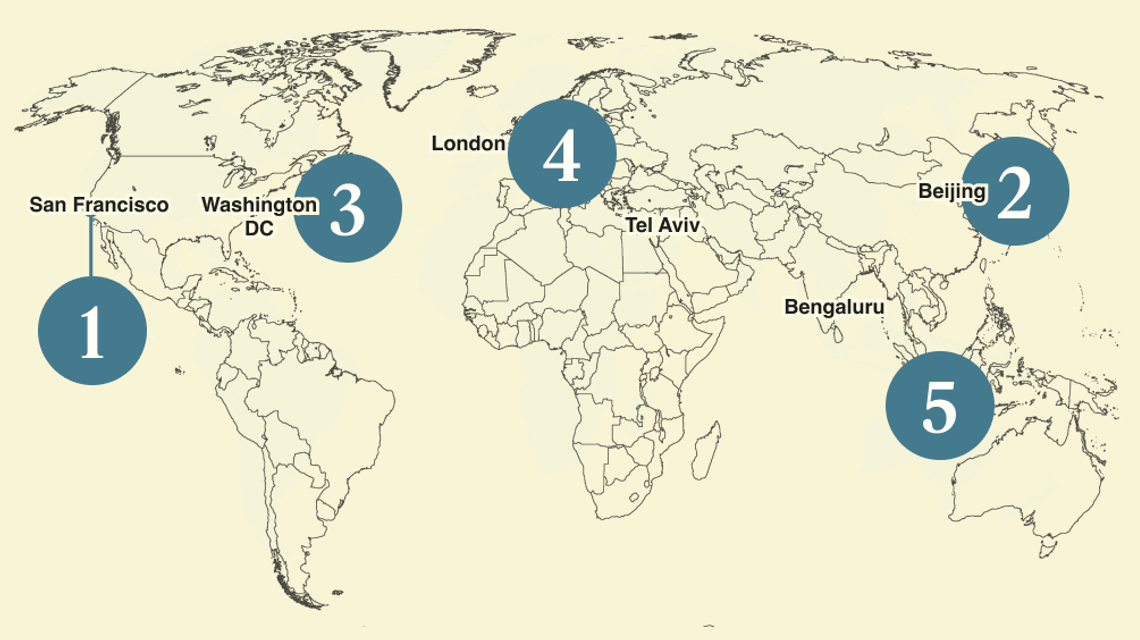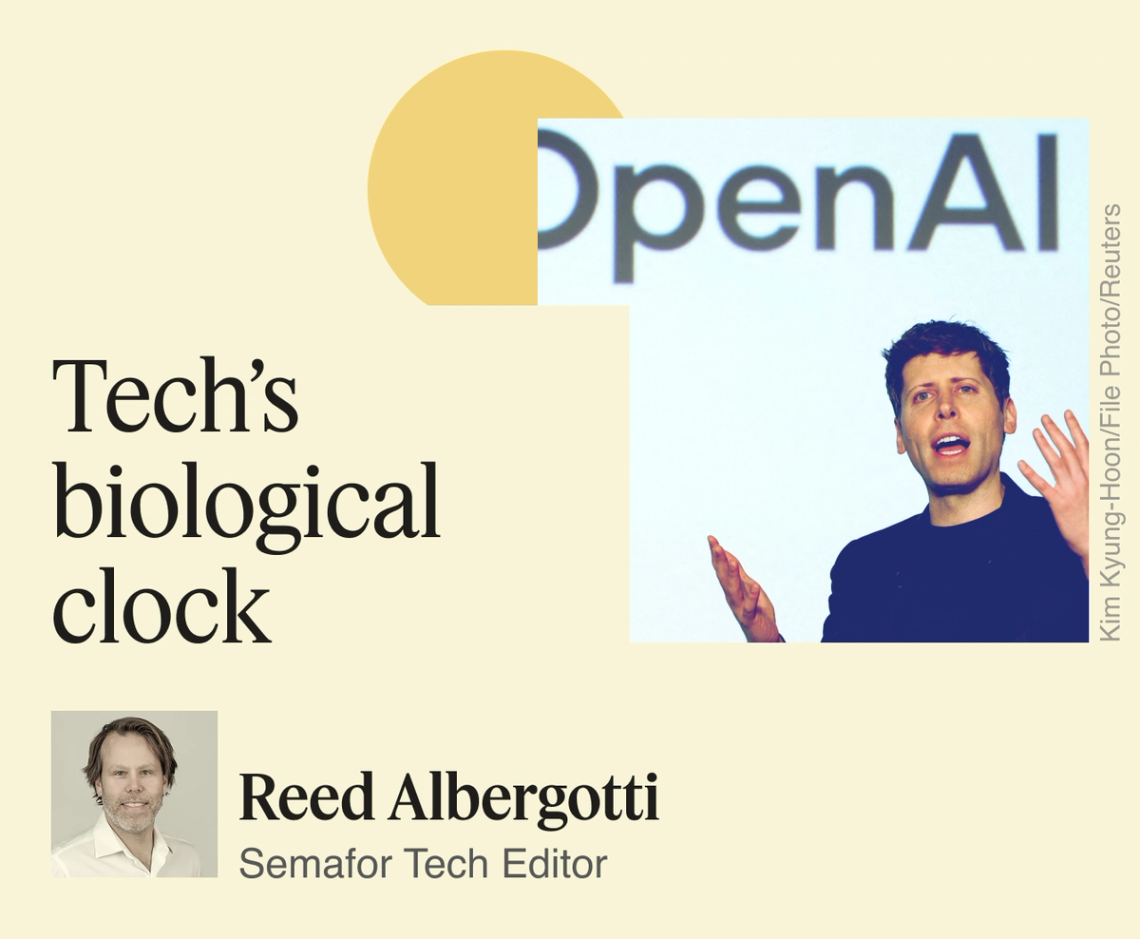| | In this edition, why tech won’t need a “bailout,” and Microsoft’s head of superintelligence still wa͏ ͏ ͏ ͏ ͏ ͏ |
| |  | Technology |  |
| |
|
 - Mustafa’s human superintelligence
- A China warning
- Quantum’s DC moment
- Europe hits pause
- Google hits the islands
 Why OpenAI won’t need a government “backstop,” and how AI-powered radars are helping protect polar bears, and humans. |
|
 OpenAI CFO Sarah Friar inadvertently caused a news cycle Wednesday when she suggested OpenAI wants a government “backstop.” Friar walked back what she said was a clumsily worded remark — but many took her to be suggesting a government role in propping up tech the way it intervened to prop up the financial system. But there’s no parallel between the banks and the tech giants. There is no “too big to fail” in the tech industry. In fact, failure is one of the key characteristics of Silicon Valley. It’s unlikely OpenAI will need a bailout, so long as customers keep paying for its services. But if it can’t keep going on its own, it will go away like countless other once-great startups. As you may recall, this almost happened: Sam Altman got fired, and almost every OpenAI employee said they were going to leave and join Microsoft. Tech companies are really just groups of talented people working toward a common goal, and a company’s failure usefully scatters them. When government is doing its job by funding basic research and incentivizing crucial infrastructure, it actually puts more pressure on the tech industry to innovate. And the industry doesn’t need a backstop to stop companies from falling off a cliff. It should be giving the bad ones a gentle nudge to make room for the next ones. |
|
Microsoft embraces superintelligence |
 Semafor’s Reed Albergotti (L) and Mustafa Suleyman. YouTube/Semafor. Semafor’s Reed Albergotti (L) and Mustafa Suleyman. YouTube/Semafor.Microsoft is joining the race for superintelligence, but with a caveat: It will prioritize human control over the technology at the expense of maximum capability. “We cannot just accelerate at all costs. That would just be a crazy suicide mission,” Microsoft AI CEO Mustafa Suleyman, who will head the company’s new superintelligence team, told Semafor this week. “We have to find ways of simultaneously having humanist superintelligence, which delivers the benefits that we’re all chasing for humans, and also accelerating technology at the same time.” As the capabilities of AI have progressed, humans’ abilities to understand and control it have lagged behind. The result is that the largest, most powerful AI “foundation models” like the ones that power ChatGPT sometimes act unpredictably, and computer scientists can’t explain why. Some of Microsoft AI’s key leaders, like chief scientist Karén Simonyan, will move to the superintelligence team. Suleyman will continue to lead Microsoft AI, where he helps shape products like Copilot, Edge, Bing, and Microsoft Advertising. The full interview is on YouTube. |
|
Jensen Huang was right to warn about China |
 Yui Mok/Pool via Reuters Yui Mok/Pool via ReutersJensen Huang may have walked back his comment on China winning the AI race, but the People’s Republic’s leading tech companies are pushing ahead at full speed. Goldman Sachs expects top firms to spend more than $70 billion next year on infrastructure like data centers and chips. While that’s only a fraction of the US’ planned investment for 2026 — pegged around $490 billion — the funding points to China’s growing supply chain and reinforces its increasing self-sufficiency. Chinese companies traditionally shell out 50% to 75% of their capital expenditures on foreign chips, Goldman said — money that will begin to be reinvested in Chinese producers. Also this week, Alibaba-backed startup Moonshot launched a new model — just four months after its last release — that cost only $4.6 million to train, compared to the billions spent by US competitors, according to CNBC. It claims to outperform ChatGPT in understanding what a user wants with limited context. The announcement piggybacks off of the success of DeepSeek, also reportedly trained cheaply. If Chinese AI models are cheaper than US versions, American tech superiority may be a minor selling point because most businesses across the world aren’t looking for AGI-level capabilities. Products that are good and cost-friendly, versus ones that are mind-blowing and expensive, could determine global AI dominance. |
|
Energy Department boosts quantum investments |
| |  | Reed Albergotti |
| |
 Thor Swift/Lawrence Berkeley National Laboratory/CC BY-NC-ND 4.0 Thor Swift/Lawrence Berkeley National Laboratory/CC BY-NC-ND 4.0It was a big week for quantum computing news, but the press missed a key story: Darío Gil, undersecretary for science at the US Department of Energy, set a goal for private industry to build a working quantum computer by 2028. It’s not quite JFK setting the moon landing goal. It’s leaving it up to the private sector, rather than a federal program like NASA. But Gil also announced $625 million of funding for quantum efforts at the national labs, which will help increase the chances of companies racing to build the technology. A couple of weeks ago, I wrote about how something like an Apollo Mission for quantum would be a good idea, and this may be as close as we’re going to get. This week also saw big news from the quantum startup Quantinuum, and DARPA announced eleven companies advanced to the second stage of its quantum benchmarking initiative, which aims to either validate or invalidate the approaches taken by companies in the program. The moon landing was a big deal, but quantum could have a bigger impact on our lives. It’s a complementary technology to AI, especially for scientific use cases. It’s surprising how little attention it’s getting. |
|
 Yves Herman/Reuters Yves Herman/ReutersThe EU is considering pausing parts of its landmark AI Act following months of pressure from US hyperscalers, the Trump administration, and European tech groups, the Financial Times reported. The most robust AI legislation globally faced blowback across industries from banking to energy over its complex framework and potential to stifle innovation. Nearly 60% of small European tech businesses said they faced delays due to regulation, with less than one third saying they felt confident in complying with new rules, according to a survey by trade group The App Association. If carried through, the changes would be a major win for Big Tech and the US, which has pushed for minimal restrictions to promote development and maintain a lead over China. It could also spur growth for European tech companies that have faced additional regulatory hurdles, which coupled with government investments in research programs, could cement the EU’s role as the third largest global player. |
|
Google eyes Christmas, the island |
 Christmas Island in 2012. Paula Bronstein/Getty Images. Christmas Island in 2012. Paula Bronstein/Getty Images.Google is building a data center on Australia’s remote Christmas Island off the coast of Indonesia, after inking a cloud-computing deal with Australia’s Department of Defense earlier this year, Reuters reported. The 52-square-mile island is a key location for monitoring naval activity in the Indian Ocean, from China and other nations. Having a data center in that region could strengthen Australia’s surveillance and intelligence, and is critical in any conflict with an adversary, a former US Navy strategist told Reuters. As part of Google’s push to shape the future of AI, the big tech firm on Thursday announced it is rolling out its most powerful AI chip yet, called Ironwood, as it takes aim at Nvidia’s semiconductor stronghold. Coming with it are upgrades to Google’s cloud, like cheaper virtual machines, making it more competitive with AWS and Azure. Also this week, the company upgraded its Google Maps navigation system with Gemini, which can answer questions about a driving route and perform some digital tasks like adding an event to a calendar, all hands-free. The slew of developments emphasizes Google’s attempt to own all aspects of AI, from the physical infrastructure to commercial software — while its competitors have focused on fewer layers of the tech stack. |
|
 Will Welch is the global director of GQ, and has been the editor-in-chief of its US operation since 2019. On this week’s Mixed Signals, Welch talks to Ben and Max about how the magazine plans to address men amid the prominence of the manosphere, the value in covering niche subcultures, and how the parties thrown by the magazine operate as content creation mechanisms. Welch also talks about how he works with celebrities, praising Robert Pattinson as a more creative collaborator than he’s used to. |
|
 Carlos Osorio/Reuters Carlos Osorio/ReutersRadar technologies powered by AI are helping detect polar bears and alert local communities to avoid any unwanted interactions, The Weather Channel reported. Climate change threatens the bears’ natural habitat on the Arctic sea ice, forcing them to spend more time on land and around humans. Developed by nonprofit Polar Bears International and radar firm Spotter Global, the “bear-dar,” as they call it, can detect the animals’ movements using AI. It recognizes the bears better than traditional radar, which struggles to pick up clean signals of the predators because of their thick fur. Tested for years in a Canadian town and zoo, the system is now fully operational for the first time at a Canadian research base studying atmospheric science and Arctic life, just 700 miles from the North Pole. When community members receive alerts that a bear is nearby, they use noisemakers to deter the bear, keeping both them and the wildlife safe. |
|
|